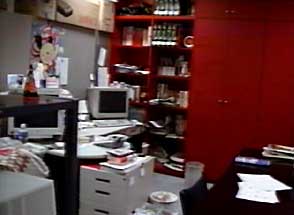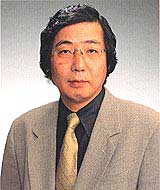by Shizuki Yamashita
|
We start on the fourth floor at the planning department. The most recent manga anthology magazines, such as "Weekly Shounen Jump," "Nakayoshi" and "Hana to Yume" line the walls. The staff devours them, combing every corner of the manga world for project ideas, a method of research Nunokawa carried over from his days at Tatsunoko Pro. The planning department's duties also include contacting publishers and manga artists, as well as approaching TV stations, distributors and merchandise manufacturers to handle the property. They also manage the international licensing of each title. Small price to pay for the chance to read manga all day.
Within the planning department, the internet division occupies a small corner, but it has an increasingly important task as the net burrows further into mainstream culture. At the moment, Pierrot's internet features are limited. But Michiyuki Honma, director of sales and a planning producer, expresses enthusiasm for developing streaming animation for the growing mobile phone internet audience in Japan. He hopes that it will change the anime industry in the process. "The anime market will be driven by the consumer market," Honma explains. "Demand via the internet will determine the pre-orders on the internet. It's an affordable way to put out only good anime, and cut down the overhead for anime production and distribution." Iijima and Kaneko usher me down the hall to where the directors work. Often producing more than four TV series simultaneously while also undergoing pre-production on several others, Pierrot has sectioned off a large space for the directors. Each of their desks is plumed with stacks of story boards, original manga and dialogue scripts. However, being of the eccentric, nocturnal artist variety, not one of the directors was around during my noontime visit. Iijima explains that they normally don't stumble in until well past three, which gives me plenty of time to thumb through scripts and story boards for the "Saiyuki" series currently running on TV Tokyo.
Kaneko then directs me to the character designers' area on the third floor. While most of Pierrot's designers, such as Takada Akemi and Keiji Gotoh, work freelance on specific projects, the in-house character designers create the artwork for promotional and retail merchandise, such as posters and video box art. But the heart of Pierrot's operation is the animation division on the second floor, a vast room dotted with small cubicles. Each contains an archaic light table where animators work frantically, sometimes into the wee hours of the night to meet broadcast deadlines. Here I learn about new time saving software being developed by Studio Pierrot referred to as PIT-01, which digitally creates the frames in between end cels- usually the tedious work of an animator. |


